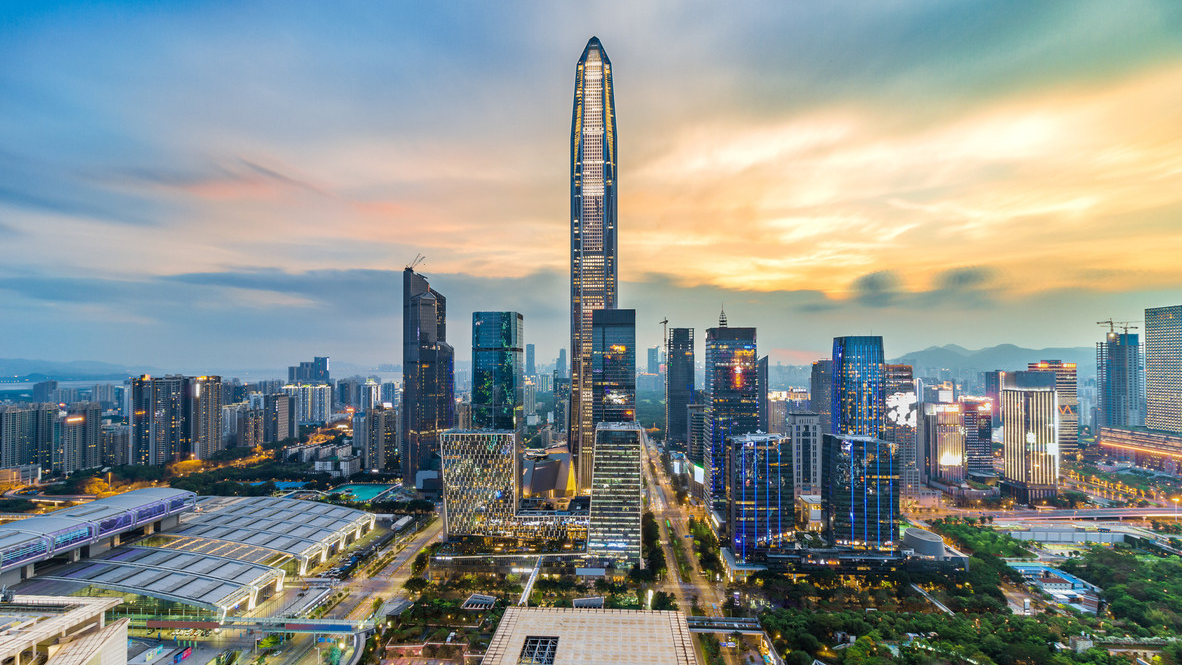Late leader's legacy in politics, economy, diplomacy continues to inspire China

On a hilltop at Lianhuashan Park in Shenzhen, Guangdong province, stands the bronze statue of late Chinese leader Deng Xiaoping (1904-97), the chief architect of China's reform and opening-up policy.
Every year, hundreds of thousands of visitors from across the country come to visit the site with a view to having a better understanding of how Deng and the policy he initiated have led Shenzhen, a metropolis that arose from a fishing village, to achieve an economic miracle.
Ahead of the 120th anniversary of Deng's birth, which falls on Thursday, Zhang Xinqiang, 40, a tourist in Shenzhen, visited Deng's statue to pay respects to the late Chinese leader.
READ MORE: On high-tech road to growth
"China's modernization is making progress based on the blueprint set out by Deng Xiaoping. The reform and opening-up he initiated has turned out to be a right path leading the country toward prosperity and progress," Zhang said.
Embarking on the path set by Deng, China has achieved new milestones in its economic and social development. Per capita GDP increased phenomenally from about $155 in 1978 to over $10,000 today, and more than 700 million people have been lifted out of poverty.
"If there were no Deng who guided our Party to make the historic decision to reform and open up, we couldn't have achieved this much," President Xi Jinping said during an inspection tour of Guangdong in December 2012 — the first one he made outside Beijing after being elected general secretary of the Communist Party of China Central Committee.
Deng's reform and opening-up policy was officially embraced at the third plenary session of the 11th CPC Central Committee in December 1978. The policy outlined the need to follow new economic management methods, introduce advanced technologies, boost economic exchanges with the outside world and scale down centralism in the planned economy to spur vitality and development.
It was Deng's southern tour in 1992, especially his visit to Shenzhen starting on Jan 19, that pushed China's reform and opening-up policy further. The 87-year-old retired statesman, also founder of the theory of a socialist market economy, called on local officials to be "bolder in carrying out reform and opening-up" and to "dare to make experiments".
His legacies in terms of politics, the economy and diplomacy have continued to inspire China across the years.
Li Junru, former vice-president of the Party School of the CPC Central Committee, said that Deng led the Party and the people in advancing reform and opening-up, aiming to achieve socialist modernization.
"Ultimately, the goal is to enable hundreds of millions of people to live happy and fulfilling lives and embark on the path to common prosperity," Li wrote in an article published in the eighth issue of Dang Jian (Party Building), a monthly magazine of the Publicity Department of the CPC Central Committee.
As China enters a crucial phase in further deepening reform and opening-up, it has a leader like Xi who has not only the vision but also the determination to transform outlines into detailed plans, and put plans into practice.
Over the past decade, more than 2,000 reform measures have been rolled out, enabling the country to eliminate extreme poverty, promote integrated urban-rural development, fight corruption, support businesses, boost innovation and push forward a green transformation.
With the reform measures, the Chinese economy has not only sustained robust growth but also more than doubled since 2012, cementing the country's status as a major contributor to global growth.
The third plenary session of the 20th CPC Central Committee, which was held in July, adopted a resolution on further comprehensively deepening reform to advance Chinese modernization, which proposed over 300 reform measures to be completed by 2029. It sent out a clear message that in China, reform will not stop and opening-up will not cease.
Recently, Qiushi Journal, the flagship magazine of the CPC Central Committee, published an article commemorating the 120th anniversary of Deng's birth, linking the third plenary session of the 11th CPC Central Committee in 1978 with the third plenary session of the 20th CPC Central Committee in July.
Observers said that by connecting the two third plenary sessions held nearly half a century apart, the article, written by the Institute of Party History and Literature of the CPC Central Committee, sends a signal that China's reform and opening-up should be seen as a continuation, encouraging the public to look forward to the next stage of reform and opening-up and further bolstering external confidence in the country's reform efforts.
ALSO READ: SME exports remain on steady track in July
Like Deng, Xi has provided a philosophy for the next stage of fast-track development. Led by Xi, China's reforms aim to not only achieve a stable growth rate by making structural adjustments, but also to rid the country of internal and external challenges and coordinate development and security.
"Starting with reform and opening-up (in 1978), the Chinese Communists have embarked on a new path of wholeheartedly focusing on development, achieving remarkable historic accomplishments. The blueprint for socialist modernization outlined by Comrade Deng Xiaoping is gradually turning into a reality," Li, former vice-president of the Party School of the CPC Central Committee, wrote in his article in Dang Jian.
On the new journey in the new era, the nation should unwaveringly carry forward reform and opening-up to give stronger momentum to the drive of Chinese modernization, Li added.
Xi Ruoshui in Shenzhen contributed to this story.
Contact the writers at caodesheng@chinadaily.com.cn


